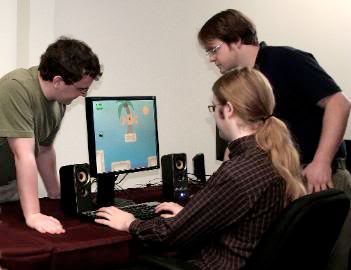 Jan-Pieter van Seventer has ten years of experience in the Dutch game industry as a designer for consoles, PC and handhelds. He has been working at game company W! games as a production director for years and teaches at the Game Design department at the School of Arts in Utrecht. Since 2008 he is also the strategic director at development center Dutch Game Garden.
Jan-Pieter van Seventer has ten years of experience in the Dutch game industry as a designer for consoles, PC and handhelds. He has been working at game company W! games as a production director for years and teaches at the Game Design department at the School of Arts in Utrecht. Since 2008 he is also the strategic director at development center Dutch Game Garden.
Today, he talks to us about game education and development. He discusses what could be changed and how much more effective both could become.
We’ve talked about it several times before: something’s not right with game education. Can you explain what’s wrong with it?
Van Seventer: “There has been so much invested in education for art, design and programming that it is about time to focus on the forgotten disciplines like game management and marketing. Managing game teams brings with it its own specific challenges which aren’t discussed in traditional management education. Things like managing the production of an interactive entertainment software product, for example, is so profoundly different from managing business processes or software that it is quite easy to develop a four year program for it. Marketing expertise with games has become a separate business since the market of games is so different.”
What are some of the most common mistakes when developing games?
Van Seventer: “Going into production way too fast. Not enough is being thrown away. When people start to realise that a failed prototype is not acceptable and maybe the reason why the next prototype was made into a hit game, they can give a little bit more space to experiment and check everything more thoroughly before executing.
Another mistake is thinking that games are plannable in the same way as the build process of a new house is. Because of the at times surprising outcome of an interactive product, including the unplanned actions of players, a game is something that has to be developed iteratively (players and developers are seen as equal partners). Methods from the Agile Development like Scrum can be an answer to this and better play into the nature of the product.”
How can teams that are already in business be improved? And how does education play a part?
Van Seventer: “Applying Scrum in current teams is a possibility. And regularly hiring young people from certain studies to the current teams keeps the team fresh and sharpens the veterans a little. Schools would do well to apply Scrum-like development processes to give that experience before students step into the company life.”
What role is often missing from a team?
Van Seventer: “A good producer; someone who can have a good overview over the processes and can tie them together. Depending on the team it is wise to trust this role to someone fulltime at the beginning of the company’s existence instead of trying to push it in way later.
What is, in your opinion, the ultimate team? Which roles are fulfilled and how do they work together?
Van Seventer: “A team that runs on trust and where the creation, production and business balance is divided through the team. The ultimate team knows what they’re good at and what they aren’t good at.
Every good game team has a lead in the area of design, art and technology, and someone who overlooks the whole, a kind of executive producer. This is needed when your team is large enough (from 15 employees). When you start a new team and you’ve covered these four main groups from the start, you’re on the right track.
A big risk is starting and growing your company with a missing link. Especially adding someone later on in the business area is tricky because the original starting employees won’t easily trust a newcomer in that area.”
What does the ultimate game education entail?
Van Seventer: “Multidisciplinary development and a close cooperation with professional game companies. Business and marketing disciplines should be included. Doing assignments for real game companies can be very stimulating.
Also, at least half of the teachers should be from that part of the sector in which they want the students to work, eventually. So for example, have people with console game development experience teach if it is the intention to have students who can look for work in that sector.”
Is there more use for specialised people, or people with a broad knowledge base that combine different specialties?
Van Seventer: “Both. big game companies need specialists and some broadly trained employees. Small companies have more use for the broadly trained. It’s very interesting to see that broadly trained people are often entrepreneurs, so they start a business for themselves. For now we will need more small game companies because a lot of innovation takes place there. It is a good market right now for small companies because of the movement to downloadable distribution with smaller games.”
Any closing remarks concerning the future of game education?
Van Seventer: “For the future of the game industry it would be a great move to have classes taught about making games as early as elementary school. This would greatly improve the knowledge and quality later on in college. Children could learn to make a game about a certain subject (like the Romans, or about trade) instead of writing a paper about it. They would learn a lot more about the subject and the connection between certain components. I think games are a great platform to make complex systems clear. It would be good for both their general knowledge development and for the quality of future game developers. What would be necessary for this would be easy-to-use game tools and editors, and teachers that aren’t afraid to try something new. Making games, not just playing them, is the future.”









LittleBigPlanet 2 anyone?
Its all everyone around the world needs ATM to make pretty much any game their imagination can come up with… Together with keyboard/mouse & move support, making a game/level has never been easier for someone even without a game oriented education. The power of a developer in your hands @ home. Heck Media Molecule even has given a job to a couple of guys that weren’t even programmers but made great levels in LBP 1 and got a job in the gaming industry, who worked in totally other branches. If that ain’t proving the way game development is changing, what is…
So yeah, making games, not just playing them could be a great shift for gaming!